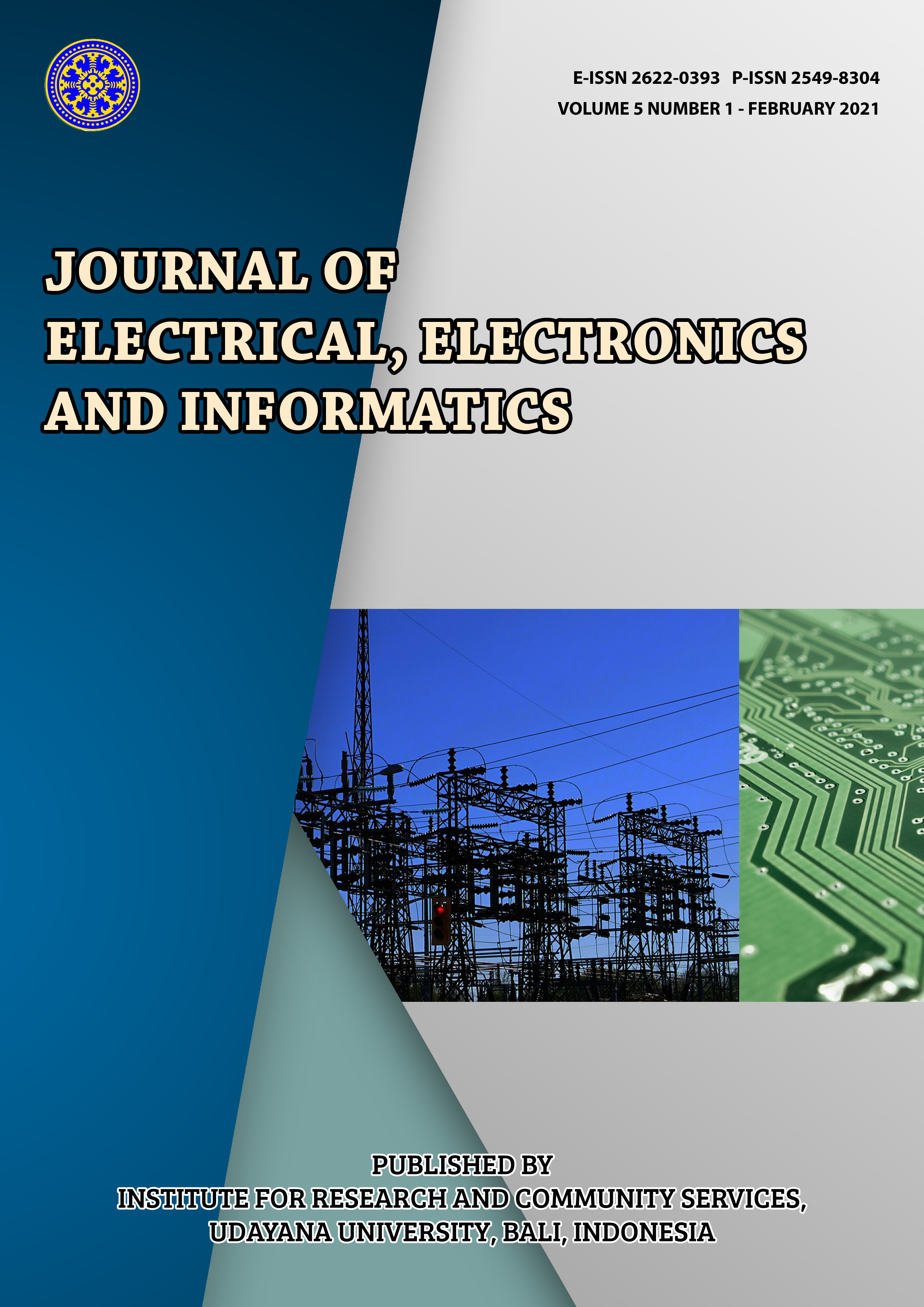The Development of Solar PV Car to Reduce Carbon Emissions from Transport Sector
Abstract
Global warming is contributed by human activities in many sectors. The sector that contributes significantly to generating carbon emissions is transportation sector. An effort to reduce carbon emissions is by utilizing PV panels on vehicle’s body surface. This paper reviews the development of vehicle-mounted PV panels around the world. The review covers technical specifications, manufacturer, and function of the PV panel on the vehicle. The objective is to get insight on the current development of vehicle with PV panels. The information presented in this paper is expected to provide updates for stakeholders in the field of renewable energy and land transportation in Indonesia. Also, this information can be used as a reference for further research on vehicle with PV panels both in Indonesia or elsewhere that are developing future environmentally-friendly vehicle. The result is a database consists of 948 vehicle which has solar PV around the body of the vehicle. 936 vehicles or about 99% were made for solar car race and only 1% for commercial and prototype. The solar PV system serves as a main or auxiliary power supply of the vehicle depending on whether they are hybrid or fully electric cars.
Downloads
References
[2] Julyus J. Andersson. (2019). Carbon Taxes and CO2 Emissions: Sweden as a Case Study. American Economic Journal: Economic Policy 2019, 11(4): 1–30 https://doi.org/10.1257/pol.20170144.
[3] Kementerian Energi dan Sumber Daya Mineral Republik Indonesia. (2015). Dokumen Rencana Strategis Kementerian Energi Dan Sumber Daya Mineral Tahun 2015 – 2019. ESDM.
[4] Hyundai. (2019). 2020 Sonata Hybrid. Retrieved 17 March 2020, from https://www.hyundaiusa.com/us/en/vehicles/sonata-hybrid.
[5] Lightyear. (2019). Lightyear One. Retrieved 17 March 2020, from https://lightyear.one/lightyear-one/.
[6] The United States Environmental Protection Agency. (2016). How do Hybrids Work? Retrieved 23 March 2020, from https://www.fueleconomy.gov/feg/hybridtech.shtml.
[7] Climate Transparency. (2019). Brown to Green 2019: Indonesia Country Profile (pp. 1–20). Climate Transparency. https://www.climatetransparency.org/wpcontent/uploads/2019/11/B2G_2019Indonesia.pdf
[8] Setiawan, I., Indarto, I., & Aan, D. (2019). Reducing CO2 Emissions from Land Transport Sector in Indonesia: Case Study Automobiles Sector. Journal of Physics: Conference Series, 1167, 012008. https://doi.org/10.1088/1742-6596/1167/1/012008.
[9] World Solar Challenge. (1987 – 2019). Past Winners. Retrieved 17 July 2020, from https://www.worldsolarchallenge.org/.
[10] American Solar Challenge. (1990 – 2018). Past Winners. Retrieved 17 July 2020, from https://www.americansolarchallenge.org/.
[11] Formula Sun Grand Prix. (2000 – 2019). Past Winners. Retrieved 17 July 2020, from https://www.americansolarchallenge.org/.
[12] South Africa Sasol Solar Challenge (2008 – 2018). Past Winners. Retrieved 17 July 2020, from https://www.solarchallenge.org.za/.
[13] Solar Car Challenge. (1995 – 2019). Past Winners. Retrieved 17 July 2020, from https://www.solarcarchallenge.org/challenge/.
[14] Karma Automotives (2019). Karma Revero GT. Retrieved 17 March 2020, https://www.karmaautomotive.com/reverogt.
[15] Sono Motors (2019). The Sion. Retrieved 17 March 2020, from https://sonomotors.com/en/sion/.
[16] Venturi Automotive. (2006). Concept Car. Retrieved 17 March 2020, from https://www.venturi.com/en/concept-car /
[17] New Atlas. (2013). P-MOB Electric Car Travels 20 Km on Solar Power Alone. Retrieved 17 March 2020, from https://newatlas.com/p-mob-solar-electric-car/28691/.
[18] Solar Mobil Manipal. (2011). Completed Projects. Retrieved 17 March 2020, from https://www.solarmobilmanipal.in/.
[19] Hochschule Bochum. (2015). SolarBuggy OpenWorld. Retrieved 17 March 2020 http://solarbuggy.hs-bochum.de/historie/open-world/
[20] Hitech Electric. (2017). e.coTech Datasheet. Hitech Electric.
[21] Squad Mobility. (2019). Squad Solar Car. Retrieved 17 July 2020, from https://squadmobility.com/
[22] The Organization for Economic Co-operation and Development (OECD). Who We are. Retrieved 17 July 2020, from http://www.oecd.org/about/.
[23] Muhammad Thowil Afif, Ilham Ayu Putri Pratiwi. (2015). Analisis Perbandingan Baterai Lithium-Ion, Lithium-Polymer, Lead Acid dan Nickel-Metal Hydride pada Penggunaan Mobil Listrik – Review. Jurnal Rekayasa Mesin Vol.6, No.2 Tahun 2015: 95-99 ISSN 2477-6041.
[24] Elizabeth Putri Permatasari, Mega Permata Rindi, Agus Purwanto. (2017). Pembuatan Katoda Baterai Lithium Ion Iron Phospate (LiFePO4) dengan Metode Solid State Reaction. EQUILIBRIUM Volume 16 No.1 Januari 2017 Online at http://equilibrium.ft.uns.ac.id.
[25] Bambang Sugiyantoro, F. Danang Wijaya, Fajar Wijayanto. (2015). Perbandingan Unjuk Kerja Motor Reluktan Sinkron dan Motor Sinkron. Departemen Teknik Elektro dan Teknologi Informasi, FT UGM. ISSN: 2085-6350 Yogyakarta, 15 September 2015 CITEE 2015.
[26] Steven Hegedus, Antonio Luque. (2011). Achievements and Challenges of Solar Electricity from Photovoltaics. Wiley.
[27] Cars and Drivers. (2019). 10 Non-Hybrid, Non-Electric Cars with the Highest MPG in 2019 - 2020. Retrieved on 30 August 2020, from https://www.caranddriver.com/features/g15382442/best-gas-mileage-nonhybrid-cars-gasoline-nonelectric/?slide=19.
[28] Kementerian Lingkungan Hidup. (2012). Metodologi Penghitungan Tingkat Emisi Gas Rumah Kaca. KLHK.
[29] Federal Highway Administration. (2018). Average Annual Miles per Driver. Retrieved on 30 August 2020, from https://www.fhwa.dot.gov/ohim/onh00/bar8.htm.
[30] Kementerian Energi dan Sumber Daya Mineral Republik Indonesia. (2017). Kajian Penggunaan Faktor Emisi Lokal (Tier 2) dalam Inventarisasi GRK Sektor Energi. Jakarta: Pusat Data dan Teknologi Informasi ESDM. ESDM.
[31] Kementerian Energi dan Sumber Daya Mineral Republik Indonesia. (2020). Menengok Ladang Panel Surya Terbesar di Indonesia. Retrieved at 20 August 2020, from http://ebtke.esdm.go.id/post/2020/03/13/2508/menengok.ladang.panel.surya.terbesar.di.indonesia#:~:text=%22Seluruh%20Indonesia%2C%20kapasitas%20terpasang%20mencapai,sisanya%20PLTS%20on%20the%20ground..
[32] Tempo. (2013). Sapu Angin Surya Menjajal Gurun Australia. Retrieved 19 August 2020, from https://koran.tempo.co/read/ilmu-dan-teknologi/325539/sapu-angin-surya-menjajal-gurun-australia?.
[33] Institut Teknologi Sepuluh Nopember. (2015). Widaya Wahana V. Retrieved 19 August 2020, from http://sko.its.ac.id/widya-wahana-v/.
[34] Radar Jogja. (2019). SMK Ma’arif Wates 1 Ciptakan Mobil Listrik Tenaga Surya. Retrieved at 22 August 2020, from https://radarjogja.jawapos.com/2019/12/13/smk-maarif-temon-1-ciptakan-mobil-listrik-tenaga-surya/.
[35] Kompas. (2019). Siswa SMK di Banyumas Ciptakan Mobil Listrik Tenaga Surya, Melaju hingga 40 Km Per Jam. Retrieved at 22, August 2020, from https://regional.kompas.com/read/2019/09/03/06553391/siswa-smk-di-banyumas-ciptakan-mobil-listrik-tenaga-surya-melaju-hingga-40?page=all.
[36] The United States Environmental Protection Agency. (2020). Most Efficient Cars by EPA Size Class (Excluding Electric Vehicles). Retrieved 02 September 2020, from https://www.fueleconomy.gov/feg/best-worst.shtml.

This work is licensed under a Creative Commons Attribution-ShareAlike 4.0 International License.











